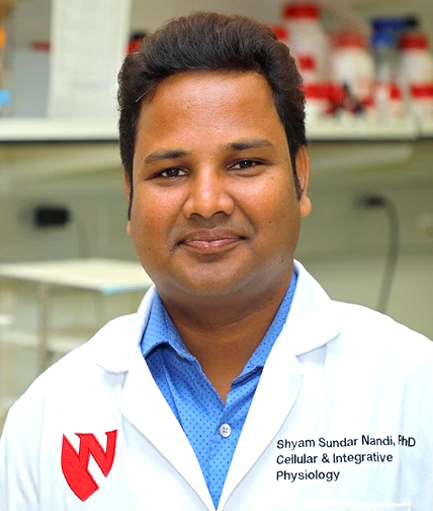Assistant Professor
PhD 2013, CSIR-Indian Institute of Chemical Biology, Kolkata.
Specialty: Molecular Cardiology, miRNAs, Mitochondrial Biology, Autophagy.
Major Interest: To understand the molecular mechanisms of mitochondrial dysfunction in chronic heart failure. Targeting ischemia-induced altered mitophagic and autophagic adaptations by miRNAs/lncRNAs to mitigate mitochondrial abnormality in chronic heart failure.
Email
Research in the laboratory is focused on the neural regulation of cardiovascular and renal function in health and disease states. We are studying several mechanisms of the mitochondrial dysfunctions in adverse cardiac and renal remodeling during disease states such as heart failure, diabetes, and hypertension. We hypothesized that mitochondrial dysfunction contributes to the exaggerated sympathoexcitation and adverse cardiac and renal remodeling in chronic heart failure. A compromised mitochondrial quality control mechanism (fission-fusion dynamics, biogenesis and mitophagy) contributes to mitochondrial dysfunction in heart failure. Mitochondrial dysfunctional have two-fold effects on cardiac muscle/ cell: a) it reduces ATP generation; b) it increases reactive oxygen species (ROS) generation. Recent clinical trials show that ROS level cannot be scavenged through antioxidant therapy. Therefore, an alternate strategy is required to reduce the levels of ROS generated from mitochondrial dysfunction in heart failure. ROS-producing defective mitochondria can be removed by the process of mitophagy/ autophagy activation. However, mitophagy/ autophagy plays both protective and/or detrimental roles in the heart/cardiomyocytes in a stimulus-dependent manner. The goal of my research is to normalize the altered mitochondrial quality control mechanisms, ROS generation, metabolic shift, and associated mitophagic/ autophagic maladaptations to mitigate the adverse cardiac and renal remodeling in chronic heart failure. My special emphasis is to explore the mechanisms of mitochondrial abnormality in heart failure and its regulation by hypoxia-inducible factor 1-alpha (HIF1A), a master regulator of O2 homeostasis and small molecules (e.g. miRNAs/ lncRNAs) that regulates HIF1A. Manipulation of mitochondrial quality control mechanisms by these molecules will be important and new therapeutic targets for the better management of chronic heart failure. Overall, my research will employ the integrative approach through biochemical, molecular biology, electrophysiological, hemodynamic and renal function measurements, and techniques applied to experimental rodent models of chronic heart failure and in vitro cell cultures.


